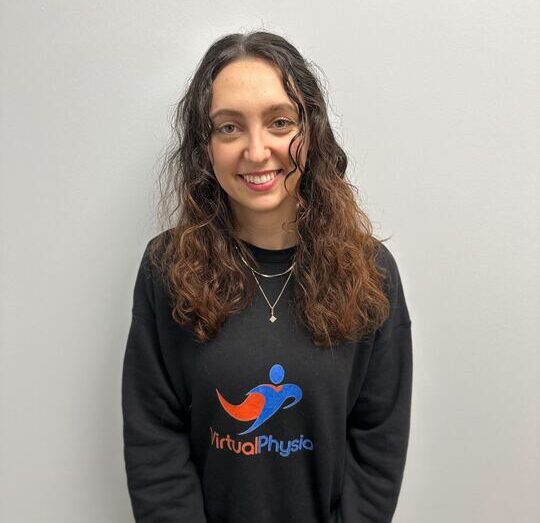We’re thrilled to introduce Dr. Anna, the newest addition to the Virtual Physio team! As a highly skilled pelvic health physical therapist, Dr. Anna brings a wealth of expertise, compassion, and a patient-centered approach to care.
With a Doctorate in Physical Therapy (DPT) and specialized training in pelvic floor rehabilitation, perinatal care, and orthopedic conditions, Dr. Anna is passionate about helping individuals regain confidence and function in their bodies. She takes a holistic approach, addressing not just symptoms but the root causes of discomfort, ensuring long-term healing and wellness.
Dr. Anna excels at treating:
✅ Pregnancy & Postpartum Recovery – Helping moms stay strong, reduce pain, and prepare for labor & delivery.
✅ Pelvic Pain & Dysfunction – Providing evidence-based treatments for conditions like painful intimacy, chronic pelvic pain, and endometriosis-related discomfort.
✅ Bladder & Bowel Health – Offering solutions for leakage, urgency, constipation, and other concerns that impact daily life.
✅ Athletes & Active Individuals – Combining movement analysis and strength-based rehab to optimize performance and prevent injuries.
What sets Dr. Anna apart is her deep commitment to patient empowerment. She believes in creating a safe, supportive environment where patients feel heard, validated, and actively involved in their recovery journey. Whether you’re seeking help for a specific condition or looking for guidance on preventative pelvic health, Dr. Anna is here to support you every step of the way!
Join us in welcoming Dr. Anna to the Virtual Physio family! 🎉 If you’re ready to take charge of your pelvic health, book an appointment today and experience her compassionate, expert care firsthand.
Learn more about Dr. Anna, her background, and how she’s an invaluable asset to the Virtual Physio Team below.
Personal Background & Passion for Pelvic Health
What inspired you to specialize in pelvic health physical therapy?
My journey into pelvic floor physical therapy was fueled by a mix of personal experience and a deep awareness of how underserved women’s health is. While attending an all-female college, I constantly heard stories from friends struggling with issues like painful intimacy, postpartum challenges, and leakage during sports. I, too, faced pelvic floor issues and knew that what we were experiencing couldn’t be “normal.”
During PT school, I saw firsthand how often women’s concerns were dismissed by medical professionals. I knew I wanted to be a voice for these women—to help them heal rather than be ignored.
Can you share a personal or professional experience that shaped your approach to pelvic health care?
I’ve struggled with chronic UTIs since I was young. I remember one particularly bad episode where I was in excruciating pain—stabbing sensations in my back, barely able to walk. My then-boyfriend didn’t understand why I was crying over “just a UTI” and played on his phone while I sat in agony at urgent care.
When I was finally seen, the male doctor glanced at my skyrocketing heart rate and blood pressure and asked, “Are you anxious?” I told him I was in severe pain, but he dismissed me with the all-too-familiar, “But it’s just a UTI.” I left with antibiotics and Tylenol, feeling unheard and invalidated.
That moment solidified my commitment to being a provider who listens—who takes women’s symptoms seriously and looks beyond quick fixes.
What do you love most about working with perinatal clients?
Helping moms feel stronger and more comfortable during pregnancy, easing their pain, and preparing them for a smoother birth is incredibly rewarding. There’s nothing more fulfilling than seeing a patient through pregnancy and then meeting their newborn at a postpartum visit!
How does your own life experience influence the way you treat and support your patients?
Having dealt with pelvic and bladder issues myself, I understand the frustration of feeling dismissed by doctors. I also know how quick some providers are to prescribe medications that disrupt hormones or recommend invasive procedures without exploring alternatives.
That’s why my approach is holistic. I listen deeply, consider the whole person—mind, body, and spirit—and provide care that empowers my patients rather than just masking symptoms.
Education, Expertise & Approach
What is your professional background, and what led you to join the Virtual Physio team?
I started my PT career in 2020—arguably the worst timing for a new healthcare professional! My interests were split between women’s health and stroke rehabilitation, but due to COVID, job opportunities were scarce.
I took my first position at a nursing home where my dad was the director, thinking it would be a good opportunity to work with stroke patients. After a year, I knew I wanted more variety and became a travel PT. I gained experience in hospitals, outpatient clinics, and home health, treating everything from sports injuries to neurological disorders.
Through these experiences, I honed in on what I truly loved—women’s health. When I was ready to settle down, I sought out a company that prioritized both patient care and employee well-being, which led me to Virtual Physio.
What makes your approach to pelvic health unique?
I provide undivided attention, treating my patients as whole individuals rather than just a set of symptoms. I incorporate movement analysis, humor, and personal connection to build trust and make therapy an engaging experience.
Can you describe a particularly rewarding patient success story?
I worked with a third-time mom who had previously endured long, difficult labors with significant tearing. She also struggled with constipation and leakage that worsened throughout her pregnancy.
After working together through targeted pelvic floor and movement-based exercises, she had a short labor, delivered with just three pushes, and—best of all—no tearing! Her postpartum recovery was smoother, and her leakage and constipation significantly improved.
What common misconceptions do people have about pelvic floor therapy?
Many assume it’s just internal exams and breathing exercises. While those can be components, pelvic health therapy is so much more! We assess the entire body—posture, movement, core engagement—and tailor treatments accordingly. Also, internal exams are never mandatory; we achieve excellent results with external techniques alone.
What are some signs that someone should see a pelvic health specialist, even if they don’t have obvious symptoms?
I believe every woman should have a pelvic floor check-up at some point—just like an annual gynecological visit. Beyond that, signs you could benefit from pelvic PT include:
- Pregnancy or postpartum (even if symptom-free)
- Pain with intimacy
- Painful periods
- Recurring UTIs
- Chronic constipation
- Chronic hip or back pain
Clinic & Treatment Philosophy
What can new patients expect during their first visit?
The first 10-15 minutes are spent discussing your health history, lifestyle, and goals. Then, I perform a full-body movement assessment, examining how your muscles and joints function together. If you’re comfortable, we can include an internal pelvic floor exam, but it’s always your choice.
Finally, we go over findings and create a customized plan to get you back to feeling your best.
How do you help patients feel comfortable and empowered during sessions?
Active listening and genuine advocacy are key. I also challenge patients just enough to build confidence in their body’s abilities—many need someone to believe in them before they can believe in themselves!
What role does movement analysis play in your treatment approach?
Movement analysis helps identify imbalances, compensations, and inefficient movement patterns that contribute to pelvic floor dysfunction. By assessing posture, gait, breathing, and core control, I can tailor interventions that not only relieve symptoms but also prevent future issues.
How do you tailor treatment for different stages of pregnancy and postpartum recovery?
I combine research-backed strategies with individualized assessments. Every session starts with a discussion of any new discomforts or changes, ensuring treatment aligns with both the patient’s needs and long-term goals.
Personality & Interests
When you’re not in the clinic, how do you like to spend your free time?
I love exploring Virginia’s nature, food, and activities with my boyfriend and friends. I also enjoy baking, crocheting, and winding down with a good book or TV show.
What’s one fun fact that most patients don’t know about you?
I’m bilingual! I was born in Belarus and speak fluent Russian. I’m also learning Arabic, so hopefully, I’ll be trilingual soon.
If you could give one piece of advice to every new parent, what would it be?
Prioritize your health. Pelvic floor therapy isn’t just about recovery—it’s an investment in your long-term well-being. Taking care of yourself benefits not only you but also your children, relationships, and overall quality of life.
What’s your favorite way to stay active?
Hiking and weight training are my favorites! I also enjoy yoga and Pilates when I can fit them in.
Do you have a favorite book or resource on pelvic health?
I always recommend Come As You Are by Emily Nagoski for anyone wanting a deeper understanding of their body and sexuality.
Connection & Community
What do you love most about your local community?
The warmth and support—especially for families and women. It’s rare to find a community that values these things so deeply.
How do you support new moms beyond physical therapy?
Beyond PT, I offer emotional support. I’m always happy to listen—sometimes, new moms just need a space to vent.
Why is it important to talk openly about pelvic health?
For too long, women have been told that pain with sex, postpartum leakage, or declining intimacy is just part of life. It’s not.
Open conversations help women reclaim their health, confidence, and quality of life. The more we talk, the more we break the stigma.
To schedule your next visit with Dr. Anna, reach out to our team here, or give us a call at 703-828-0582.


